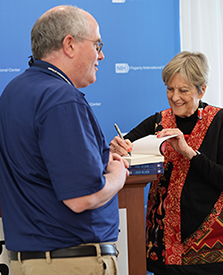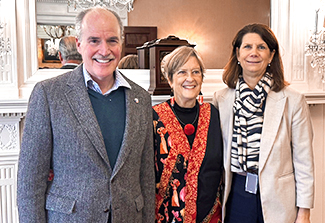In her own words: Jody Olsen (former director of the Peace Corps)
March/April 2025 | Volume 24 Number 2
 Fogarty International CenterDr. Jody Olsen signs a copy of her memoir.
Fogarty International CenterDr. Jody Olsen signs a copy of her memoir.
In early March Judy Olsen, former director of the Peace Corps, visited the National Institutes of Health to discuss her memoir, “A Million Miles.” Olsen, who has a master's degree in social work and a PhD in gerontology, held various positions at Peace Corps before becoming its Director, including Country Director in Togo; Regional Director for North Africa, Near East Asia, and Pacific; and Chief of Staff. She’s also led various NGOs and served as a visiting professor at the University of Maryland-Baltimore School of Social Work.
Dr. Peter Kilmarx, Deputy Director of the Fogarty International Center, introduced Olsen to a rapt audience at Stone House on the NIH’s main campus. Proud of his own history with the Peace Corps, he noted, “You never say ‘former’ Peace Corps volunteer, you say ‘returned’ Peace Corps volunteer, because it's a lifelong commitment.”
On finding and following her North Star
When I was 11 years old growing up in Salt Lake City, Utah, my aunt took me to work with her—this was before “Take Your Daughter to Work Day” was invented. She was the head of Lutheran Social Services and, at 11 years old, I watched her at work and right there and then I decided I wanted to be of service to others. I also realized that I had a lot of curiosity about people. I was fascinated—and I liked to ask questions!
I became a Peace Corps volunteer in Tunisia and stayed with a Muslim family, very different than a conservative Mormon family in Salt Lake City. During my two years in Tunisia, I had to strip away who I thought I was. I was a lovely lady, I'm sure, but the experience challenged everything I knew, believed or thought. That two years has been the best thing that happened to me in terms of how I reach out, how I serve, how I understand others, how I listen, how I watch. Since then, my lifelong goal has been to give that kind of opportunity to as many other people as possible.
On becoming Peace Corps Director
I was deputy director when Gaddi Vasquez left, and they interviewed me and said, “We want someone who's a returned volunteer, we want someone who shares our values, we want…” and I sat there thinking: Check, check, check… and I've already been cleared by the Senate, here goes! But then they announced somebody else: Ron Tschetter. I just… sank! That was one of those moments when I had to think about my purpose. I decided: It's about Peace Corps.
Despite how low I felt, I sent Ron a note about five minutes later (I didn't even know who he was).
Dear Ron – You know I wanted this job, so I wanted to email you immediately and say, I'm here for you. I believe in you. I'm going to be here for you.
He and I became very close friends and served very well together. It was a pure accident eight years later that I got a call from the White House asking me to be Peace Corps director. I had no idea that this could happen under the first Trump administration. Amazing!
 Fogarty International Center
Dr. Peter Kilmarx, Dr. Jody Olsen and Dr. Kathy Neuzil meet at the book signing.
Fogarty International Center
Dr. Peter Kilmarx, Dr. Jody Olsen and Dr. Kathy Neuzil meet at the book signing.
On life challenges
When I look back on my personal challenges, I credit the Mormon church as an anchor in my life, even though I'm not part of the church anymore. Most importantly, my father gave me unconditional love; he always had my back, and I always knew that whatever happened, it would be okay with him. My mother abandoned us, but he never said a bad word about her—ever. So when I met her again 20 years later, I did not come with anger. I credit my father with keeping me loving. Our family is all over the map, religion-wise, politically, and where we live, yet we've never lost that love for each other and the commitment to be there in difficult times.
My husband and I got married when I was turning 22. We volunteered for the Peace Corps together. He was my stability and my anchor for the 30 years we were married, so when he came out as gay, it was very difficult, but, because of those 30 years, he could still be my anchor. A few weeks ago, my book group was reading “A Million Miles,” and my ex-husband was on the call from Portland, Oregon. He told the group that he suspected he was gay in his late 20s, but he knew that I’d lost a mother and a brother. “I wanted to be her support. I knew she was doing exciting things, and we had kids, so I became her anchor.” I was so touched—he waited until he was almost 50 to come out because he wanted to be there for me.
Because my husband and my family have been such great anchors for me, I've learned to be an anchor for others.
On the COVID-19 pandemic:
On March 15, 2020, the associate director of Peace Corps said the regional directors and country directors are suggesting we pull all our 7,061 volunteers. We’d been getting the word for a few weeks informally, but it was then that I knew I had to make a decision.
So I made the decision. As you remember, borders were closing within 12 hours and international flights were being canceled. I didn't want my decision countered, so I told the team, “Don't tell anybody outside of the agency.” As they wrote the email for our volunteers, I said, “I want these 10,000 staff and volunteers who will get this note to know that I care, that I'm sad, that I wish I wasn't asking them to come home—but there’s no other choice.” Caring is an important part of leadership.
We got all the volunteers home in nine days. Nobody got hurt, nobody got lost, nobody got sick. Most in-country families, counterparts, school heads, taxi drivers, and cooks were there for our volunteers. They organized instant farewell parties in three hours. When there's a crisis, people give back.
On facing challenge as a leader
You need to define a challenge with words that people can hear and that give a sense as to why. Try to use “we.” Show specifically how the emergency that we all face affects them and don't blame. Never blame. “This is the situation. We're all in it. We're all struggling, we're all trying to make this work.”
Once you know it's time, make a decision, do it quickly, but with enough information. Encourage people to know they can manage the challenge and can lean on each other. I always say, “I'm hearing you. I know this is bad. I've got your back. I trust the decisions you're all having to make in each country, in other parts of the agency, and I'm with you. We know what to do. We're going to make this happen.” You don't have to agree, but you always show respect, you always honor, and you are always humble. Leadership is about humility. I'm adamant about staying out of the crosshairs. We need to quietly do what we do. Words have become toxic so it’s important to use words that do not draw attention and do not get people to turn against what we are trying to do.
On honoring others
When I was deputy director, I went to the Islamic Republic of Mauritania and we were driving across the desert to visit our volunteers, and it was 10 o'clock at night. One of the Mauritanian staff said to me, “The minister of health happens to be visiting his family in this village, and he's in a hotel two blocks away. He would like you to come and visit him.” He also told me, “Don't worry—everybody's off duty and the minister might even be wearing jeans.” (I, myself, was dressed casually.) As we drove up, I said, “Should I wear a headscarf?” And he said, “Oh, no, it’s after hours.” So I got out and started walking but then I stopped. “I'm going to be more comfortable if I put on the headscarf.”
We went in and the minister was there. We had a terrific time. The next day, Ahmed said that the minister had told him, “Your deputy director didn't need to wear a headscarf, but it was really important to me that she did. She honored us.”
More information
Updated April 2, 2025
To view Adobe PDF files,
download current, free accessible plug-ins from Adobe's website.